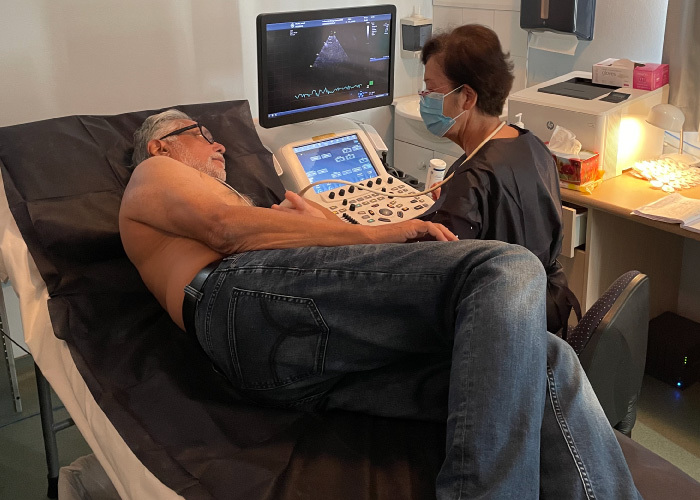Investigations
Stress Echocardiography
A stress echocardiography is a non-invasive exercise test; which involves obtaining ECG recordings and ultrasound images of the heart at rest and immediately after exercise. Results from your stress echocardiography may show whether you have significant narrowings or blockages in the vessels supplying blood to your heart.

Call for Appointment
(02) 9646 4044
Investigations Expertise
Ambulatory Blood Pressure Monitoring(ABPM)
Know everything
about Stress Echocardiography
What is stress echocardiography?
Stress echocardiography is a type of echocardiogram that involves inducing stress on the heart, through exercise, to evaluate heart function and blood flow. Stress echocardiography can diagnose and monitor a range of heart conditions, including coronary artery disease and heart valve problems.
How is stress echocardiography done?
During a stress echocardiography, the patient exercises on a treadmill while a transducer is placed on their chest. The transducer emits sound waves that bounce off the heart and create images on a screen, allowing the cardiologist to evaluate heart function and blood flow during stress. We review the ECG and blood pressure measurements made before, during and after the test. It is important to increase the heart rate adequately by exercising on the treadmill and then quickly getting the ultrasound images as soon as possible.
The exercise and resting images are then compared side-by-side and the effect of exercise on various walls of the left ventricle and its overall function is analyzed. We also review the ECG and blood pressure measurements made before, during and after the test. This information allows us to determine whether there is adequate blood flow to heart muscle during exercise.
Is stress echocardiography safe?
Stress echocardiography is a non-invasive, simple exercise test and is safe.
How do I prepare for a stress echocardiography?
Patients may be asked to fast for a certain period of time before the test, avoid certain medications, or wear comfortable clothing and shoes suitable for exercise.
How long does a stress echocardiography take?
A stress echocardiography typically takes 20 minutes to complete, including both the exercise and the imaging portion.
Will I experience any discomfort during the test?
During the exercise or medication portion of the test, patients may experience some discomfort or fatigue. However, the echocardiogram imaging itself is painless.
When will I get the results of my stress echocardiography?
The results of a stress echocardiography are typically available on the day of the procedure. Your cardiologist will review the results with you and discuss any next steps or treatment recommendations.
Do I need a referral from my primary care physician to schedule a stress echocardiography?
Yes. A referral from a doctor is required to schedule a stress echocardiography.
Call for Appointment
(02) 9646 4044
Investigations Expertise
Ambulatory Blood Pressure Monitoring(ABPM)
Book an Appointment
Call for appointment/GP referral
(02) 9646 4044
